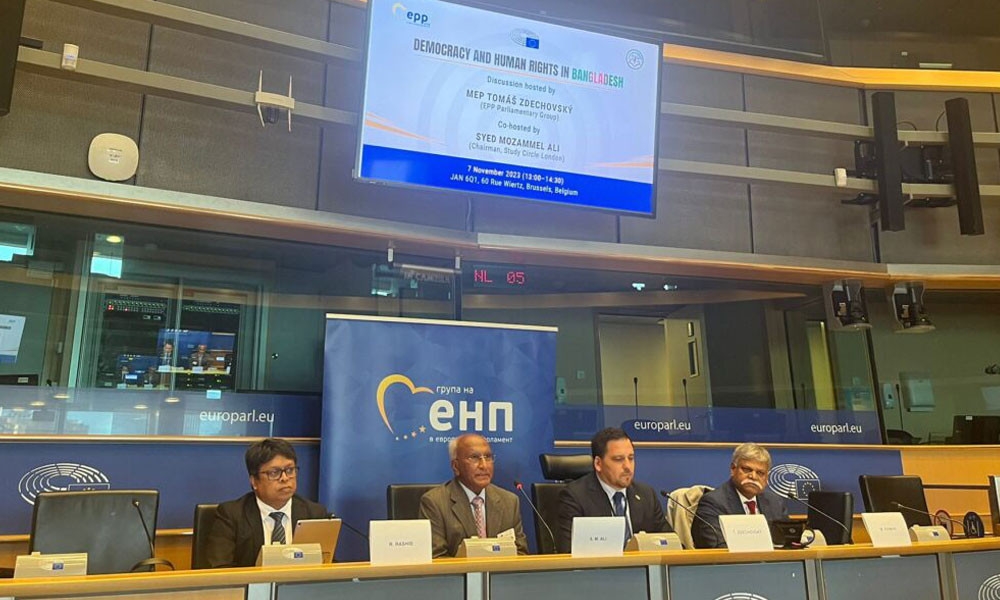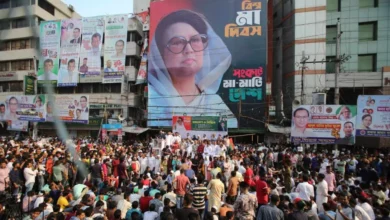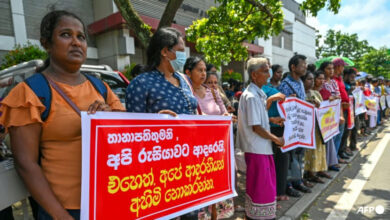UN Human Rights Council to review Bangladesh’s rights record tomorrow
Law Minister Anisul Huq will lead the Bangladesh delegation at the review meeting to be held in Geneva

Geneva: Bangladesh’s human rights record will be examined by the United Nations Human Rights Council’s Universal Periodic Review (UPR) working group for the fourth time on Monday.
Law Minister Anisul Huq will lead the Bangladesh delegation at the review meeting to be held in Geneva.
Bangladesh’s first, second and third UPR reviews took place in February 2009, April 2013, and May 2018, respectively.
In its submitted national report, Bangladesh said it would continue to strengthen its institutions and measures to promote and protect human rights.
As a nation built on the sacrifices of martyrs and the struggle of freedom fighters to achieve the rights of its people, Bangladesh said, it continues to maintain its unwavering commitment to human rights obligations.
The UPR working group comprises the 47 Member States of the Human Rights Council. However, each of the 193 UN Member States can participate in a country review.
The documents on which the reviews are based are: 1) national report – information provided by the State under review; 2) information contained in the reports of independent human rights experts and groups, known as the Special Procedures, human rights treaty bodies, and other UN entities; 3) information provided by other stakeholders including national human rights institutions, regional organizations, and civil society groups, according to UN Human Rights Council.
The UPR is a peer review of the human rights records of all 193 UN Member States. Since its first meeting was held in April 2008, all 193 UN Member States have been reviewed thrice.
During the fourth UPR cycle, states are again expected to spell out steps they have taken to implement recommendations posed during their previous reviews which they committed to follow up on and highlight recent human rights developments in the country.
Questions related to steps taken by the government to ensure a free and fair national election, freedom of assembly and of expression, and the vital role of journalists, human rights defenders and civil society are likely to come during the review, a diplomatic source told UNB.
Future pledges
In pursuance to its commitment to the UPR process, Bangladesh will continue to update policies and legislations to implement its international human rights obligations, according to a submitted national report.
It said Bangladesh will make efforts to enforce different Acts aiming at the promotion and protection of human rights to make the violators of human rights accountable.
Bangladesh will further strengthen national institutions that promote human rights, rule of law, democracy and good governance and involve NGOs, CSOs and other stakeholders in human rights promotion at all levels, said the report.
It will promote a “culture of peace” and support collective measures against racism, sexism, xenophobia, and protect the victims against such crimes.
According to the report, Bangladesh will pursue its pro-people development agenda with focus on women, children, minorities, persons with disabilities, vulnerable sections of the society, climate change and sustainability and will engage with the UN, its treaty bodies and other human rights mechanisms of the UN as well as international partners for improvement of human rights in Bangladesh as well as promotion of human rights worldwide.
Bangladesh thinks a stronger cooperation and support from the external partners including developed countries, countries from the Global South, UN agencies and entities, international financial institutions and other international organizations can play a complementary role in Bangladesh’s continued efforts to promote and protect human rights of its citizens, reads the report.
Universal Periodic Review
The Universal Periodic Review (UPR) is a unique mechanism of the Human Rights Council that calls for each UN member state to undergo a peer review of its human rights records every 4.5 years.
The UPR provides each state the opportunity to regularly:
1) Report on the actions it has taken to improve the human rights situations in their countries and to overcome challenges to the enjoyment of human rights.
2) Receive recommendations – informed by multi-stakeholder input and pre-session reports – from UN member states for continuous improvement.
Established in March 2006 by the UN General Assembly in resolution 60/251, the UPR is designed to prompt, support, and expand the promotion and protection of human rights in every country.
As a constitutional democracy, Bangladesh continues to remain “fully committed” to protecting human rights for all.
Under the government led by Prime Minister Sheikh Hasina, Bangladesh has been adopting progressive policies to realise a better society for all where fundamental human rights, the rule of law, equality, and justice prevails, officials said.
Bangladesh considers all human rights to be universal, indivisible, interrelated, interdependent, and mutually reinforcing.
Since the 3rd cycle of Universal Periodic Review, the government of Bangladesh continued to adopt legislative and policy reforms, “enhance” democratic institutions and accountability mechanisms to realize the aspiration of “a society in which the rule of law, fundamental human rights and freedom, equality, and justice, political, economic and social, will be secured for all citizens” as pledged by the constitution.



![Mumtaz Zahra Baloch, spokesperson for Pakistan's Foreign Ministry, says the country believes in constructive dialogue with the US [Courtesy of Pakistan Ministry of Foreign Affairs]](https://southasiancorrespondent.com/wp-content/uploads/2024/06/pak-1-390x220.jpg)
